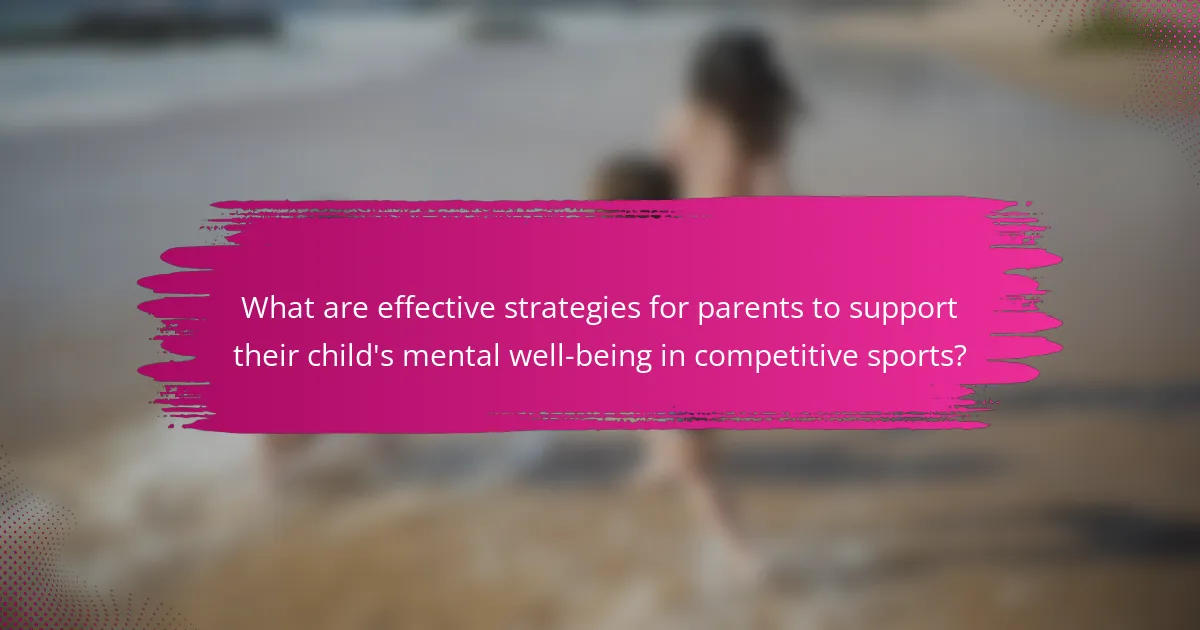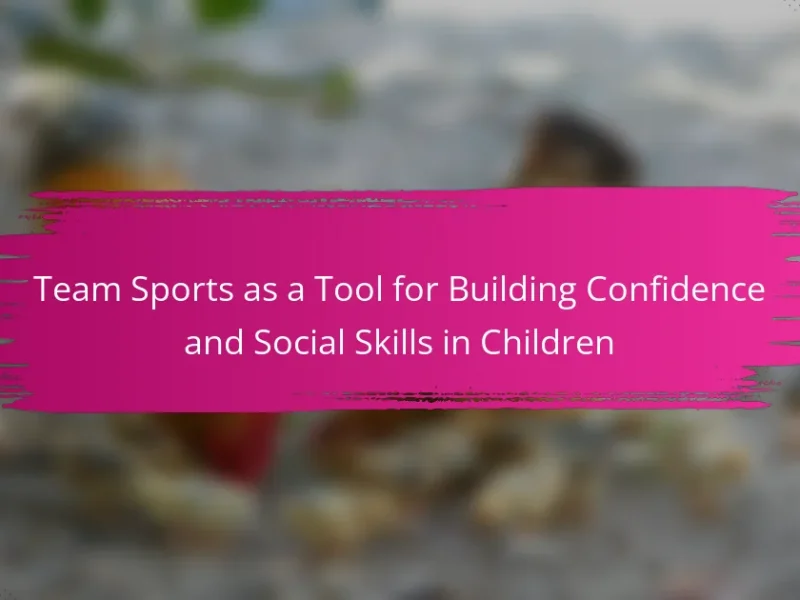Supporting a child’s mental well-being in competitive sports is crucial for their overall development and enjoyment. Parents can foster a positive environment, encourage open communication, and emphasize personal growth over competition. Monitoring stress levels and modeling healthy coping strategies are essential. Tailoring support to individual needs can significantly enhance a child’s resilience and confidence in sports.

What are effective strategies for parents to support their child’s mental well-being in competitive sports?
To support their child’s mental well-being in competitive sports, parents should foster a positive environment and focus on communication. Encourage open discussions about feelings related to performance and competition. Emphasize effort over results, promoting intrinsic motivation. Establish a balance between sports and other life activities to prevent burnout. Monitor stress levels and be attentive to signs of anxiety or pressure. Finally, model healthy coping strategies, demonstrating resilience and a positive attitude towards challenges.
How can parents foster a positive sports environment?
Encouraging a positive sports environment involves active support, open communication, and fostering resilience. Parents should prioritize their child’s enjoyment over winning, reinforcing the idea that participation is valuable.
Regularly discussing experiences can help children express their feelings and concerns. This dialogue builds trust and allows parents to understand their child’s mental state. Additionally, celebrating effort and improvement, rather than just outcomes, cultivates a growth mindset.
Promoting teamwork and respect among peers enhances social skills and emotional intelligence. Parents can model positive behavior by showing respect to coaches and officials, reinforcing the importance of sportsmanship.
Finally, providing a balanced approach to sports, including rest and other interests, helps prevent burnout and supports overall well-being.
What role does communication play in supporting mental health?
Effective communication is vital for supporting a child’s mental health in competitive sports. It fosters trust, openness, and emotional expression. Parents can encourage dialogue about feelings, stress, and experiences related to sports. This helps children feel validated and understood. Regular check-ins can identify emotional challenges early, allowing for timely support. Moreover, positive reinforcement through communication can boost a child’s confidence and resilience. Engaging in active listening demonstrates care and can significantly enhance a child’s mental well-being.
How can parents encourage a healthy balance between sports and other activities?
Parents can encourage a healthy balance between sports and other activities by promoting open communication and setting realistic expectations. Establish a schedule that includes time for sports, academics, and leisure activities. Encourage children to explore various interests outside of sports, fostering well-rounded development. Recognize the importance of downtime for mental recovery and stress relief. Finally, model a balanced lifestyle yourself, demonstrating the value of diverse experiences.
What are common mental health challenges faced by young athletes?
Young athletes commonly face mental health challenges such as anxiety, depression, and burnout. Parents can support their child’s mental well-being in competitive sports by fostering open communication, encouraging a balanced lifestyle, and promoting resilience. Providing a safe space for discussing emotions helps young athletes feel valued and understood. Additionally, emphasizing the importance of rest and recovery can prevent burnout, allowing athletes to enjoy their sport without excessive pressure. Engaging in activities outside of sports can also enhance their overall well-being and provide a healthy distraction.
How do performance pressures impact children’s mental well-being?
Performance pressures can negatively affect children’s mental well-being by increasing stress and anxiety. Parents can support their child’s mental health in competitive sports through several strategies.
First, encourage open communication about feelings and experiences. This helps children express concerns and reduces the pressure they may feel. Second, emphasize effort over outcome, fostering a growth mindset. This approach allows children to focus on personal improvement rather than solely on winning.
Third, set realistic expectations based on the child’s abilities and interests. This prevents undue stress and cultivates a positive sports experience. Lastly, promote balance by ensuring children engage in various activities outside of sports, which can enhance overall well-being.
Implementing these strategies can significantly improve a child’s mental resilience and enjoyment in sports.
What signs of mental distress should parents be aware of?
Parents should watch for signs of mental distress in their child, such as withdrawal from activities, changes in mood, and decreased performance in sports. These indicators can signify underlying issues that require attention.
Common signs include irritability, fatigue, and changes in sleep patterns. Parents should also be aware of physical complaints like headaches or stomachaches that may not have a medical cause.
Open communication is essential; encourage children to express their feelings. Being attuned to these signs can help parents provide timely support and promote their child’s mental well-being in competitive sports.
What unique approaches can parents adopt for different age groups?
Parents can adopt tailored strategies for each age group to enhance their child’s mental well-being in competitive sports. For younger children, focus on fostering enjoyment and teamwork. Encourage play rather than pressure to win. As children enter adolescence, emphasize self-esteem and coping skills. Teach them to manage stress and setbacks. For teenagers, support autonomy and decision-making. Allow them to set personal goals and reflect on their performance. Each approach aligns with the child’s developmental stage, promoting resilience and positive mental health outcomes in sports.
How should strategies differ for younger vs. older athletes?
Strategies for younger athletes should focus on encouragement and skill development, while older athletes benefit from mental resilience and performance analysis. Younger athletes thrive in a supportive environment that emphasizes enjoyment and personal growth. Parents can help by fostering a love for the sport and reducing pressure. For older athletes, strategies should include goal-setting and coping mechanisms for stress. Encouraging self-reflection and providing constructive feedback can enhance their mental well-being.
What are age-appropriate ways to discuss mental health with children?
Engaging children in discussions about mental health can be approached through relatable strategies. Use age-appropriate language and examples they understand. Encourage open dialogue by asking questions about their feelings and experiences, fostering a safe space for expression.
Incorporate storytelling to illustrate concepts of mental well-being, using characters they relate to. This method helps them grasp complex ideas in a digestible format. Reinforce the importance of teamwork and support in competitive sports, emphasizing that mental health is as vital as physical performance.
Model healthy coping strategies by sharing your own experiences and techniques. For instance, demonstrate mindfulness exercises or breathing techniques during stressful moments. This unique approach not only normalizes mental health discussions but also equips children with tools to manage their emotions effectively.

What universal attributes contribute to supporting mental well-being?
To support mental well-being in children involved in competitive sports, parents can focus on several universal attributes. These include fostering a positive environment, encouraging open communication, and emphasizing personal growth over competition.
A positive environment enhances self-esteem and reduces anxiety. Open communication allows children to express feelings and concerns, promoting emotional resilience. Emphasizing personal growth helps children appreciate their progress, leading to intrinsic motivation.
Research indicates that children with supportive parents experience lower stress levels and higher satisfaction in sports. This support can contribute to long-term mental well-being, instilling confidence and a love for physical activity.
How does emotional support influence a child’s performance?
Emotional support significantly enhances a child’s performance in competitive sports. It fosters confidence and resilience, allowing children to better cope with stress and pressure. Parents can provide emotional support by actively listening, encouraging open communication, and celebrating achievements, regardless of outcomes. Studies show that children with strong emotional backing are more likely to exhibit improved focus and motivation during practices and competitions. This support not only boosts their mental well-being but also cultivates a positive attitude towards sports, making them more likely to enjoy the experience.
What role does positive reinforcement play in mental health?
Positive reinforcement significantly enhances mental health by fostering a supportive environment. It encourages children to develop resilience and self-esteem. Recognizing achievements, even small ones, boosts motivation and reduces anxiety. This approach creates a positive feedback loop, promoting overall well-being in competitive sports.

What unique attributes enhance the effectiveness of support strategies?
Support strategies are enhanced by unique attributes such as individualized communication, emotional intelligence, and fostering resilience. Individualized communication allows parents to tailor their approach based on their child’s needs. Emotional intelligence helps parents understand and respond to their child’s feelings effectively. Fostering resilience equips children to cope with challenges in competitive sports. These attributes create a supportive environment that promotes mental well-being.
How can personalized coaching techniques benefit mental health?
Personalized coaching techniques can significantly enhance mental health by fostering resilience and self-esteem in young athletes. Coaches who understand individual needs create supportive environments that reduce anxiety and improve focus. Tailored feedback encourages growth and helps children navigate competitive pressures effectively.
What impact does a child’s individual personality have on support strategies?
A child’s individual personality significantly influences the effectiveness of support strategies in competitive sports. Tailoring approaches to match a child’s unique traits fosters better mental well-being. For example, a highly competitive child may thrive with encouragement and goal-setting, while a more anxious child may benefit from reassurance and relaxation techniques. Understanding these personality nuances helps parents implement strategies that resonate with their child, enhancing their overall experience in sports.

What rare attributes can be leveraged for exceptional support?
Leveraging rare attributes can significantly enhance support for a child’s mental well-being in competitive sports. Unique encouragement methods, such as personalized mental resilience training, can build confidence. Rare opportunities for open discussions about emotions foster trust and understanding. Additionally, implementing tailored relaxation techniques, like mindfulness practices, can help manage stress effectively. These approaches create a supportive environment that promotes mental health and athletic performance.
How can cultural factors influence mental well-being strategies?
Cultural factors significantly shape mental well-being strategies for children in competitive sports. Parents should consider cultural attitudes toward competition, emotional expression, and support systems.
For instance, cultures that prioritize collectivism may encourage teamwork and shared success, fostering a supportive environment. In contrast, individualistic cultures might emphasize personal achievement, which can increase pressure on children.
Understanding these dynamics allows parents to tailor their approaches. They can create strategies that align with their cultural values while promoting healthy competition and emotional resilience.
Additionally, parents can seek community resources that reflect their cultural context, enhancing support networks for their children. This holistic approach improves mental well-being and nurtures a positive sports experience.
What innovative techniques are emerging in sports psychology for parents?
Innovative techniques in sports psychology for parents include fostering open communication, encouraging a growth mindset, and implementing mindfulness practices. These strategies help parents support their child’s mental well-being in competitive sports. Open communication allows parents to understand their child’s feelings and challenges, promoting emotional resilience. Encouraging a growth mindset instills the belief that effort leads to improvement, reducing performance anxiety. Mindfulness practices, such as deep breathing and visualization, enhance focus and reduce stress during competitions.
What expert insights can guide parents in supporting mental health?
To support their child’s mental well-being in competitive sports, parents should focus on open communication, emotional support, and fostering a balanced perspective. Encouragement and understanding help children manage stress and anxiety related to competition. Parents can also promote a growth mindset, emphasizing effort over results. Additionally, ensuring adequate rest and downtime is crucial for mental recovery. Creating a supportive environment where children feel valued regardless of performance enhances their resilience and overall mental health.
What are common mistakes parents make in supporting their child?
Common mistakes parents make include overemphasizing competition, neglecting emotional support, and failing to communicate effectively. These errors can hinder a child’s mental well-being in sports. Overemphasis on winning can create pressure, while lack of emotional support may lead to feelings of isolation. Effective communication fosters trust, allowing children to express their feelings and concerns. Parents should focus on encouraging effort and enjoyment rather than solely on outcomes to promote a healthier experience in competitive sports.
What best practices can parents implement immediately?
Parents can implement strategies immediately to support their child’s mental well-being in competitive sports. Encourage open communication about feelings and experiences. Promote a balanced approach to sports by emphasizing enjoyment over winning. Set realistic expectations to reduce pressure. Foster a supportive environment by attending events and showing interest. Teach coping strategies for stress management.


